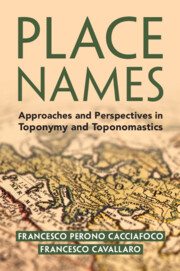Book contents
- Place Names
- Place Names
- Copyright page
- Contents
- Figures
- Tables
- Preface
- Acknowledgements
- 1 Introduction
- 2 Language Change
- 3 Historical Toponomastics
- 4 Toponymy and the Historical-Linguistic Reconstruction of Proto-Languages
- 5 Diachronic Toponymy
- 6 Landscape and Toponymy
- 7 Historical Toponomastics and Historical Geography
- 8 Synchronic Toponymy
- 9 Place Names and Society
- 10 Toponymy and Cartography
- Glossary
- References
- Index
9 - Place Names and Society
Published online by Cambridge University Press: 02 March 2023
- Place Names
- Place Names
- Copyright page
- Contents
- Figures
- Tables
- Preface
- Acknowledgements
- 1 Introduction
- 2 Language Change
- 3 Historical Toponomastics
- 4 Toponymy and the Historical-Linguistic Reconstruction of Proto-Languages
- 5 Diachronic Toponymy
- 6 Landscape and Toponymy
- 7 Historical Toponomastics and Historical Geography
- 8 Synchronic Toponymy
- 9 Place Names and Society
- 10 Toponymy and Cartography
- Glossary
- References
- Index
Summary
In this chapter, the authors explore the sociopolitical and cultural issues surrounding the uses of place names in society. Place names are social constructs that show people’s attachment to the land they live in; they help communities to navigate and orientate, pass down oral traditions, and demonstrate the changes to the landscape. Such functions of place names are more keenly felt by Indigenous communities, who share a close connection with place names, their lands, and cultural heritage. Given that toponyms have symbolic, cultural, and historical significance, they are unsurprisingly used by groups to assert control – be it a more powerful linguistic group subduing minority groups and their languages, or, in settler colonies, the colonial powers using place names to show power differentials between the coloniser and the colonised. However, natives also exercise agency, as they seek to rename and decolonise colonial names, although they are not always successful. This chapter relates to the cultural politics of naming, i.e., how people seek to control, negotiate, and contest the naming process as they engage in wider struggles for legitimacy and visibility. The chapter also deals with a gamma of different toponymic changes and with the notion of ‘toponymic nickname’, providing a comprehensive list of examples from around the world.
Keywords
- Type
- Chapter
- Information
- Place NamesApproaches and Perspectives in Toponymy and Toponomastics, pp. 221 - 241Publisher: Cambridge University PressPrint publication year: 2023



